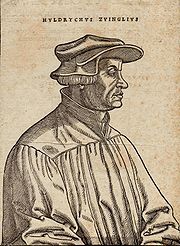Portal:Reformed Christianity/Selected article/8
The basis of the theology of Huldrych Zwingli was the Bible. He took scripture as the inspired word of God and placed its authority higher than human sources such as the ecumenical councils and the Church Fathers. He also recognised the human element within the inspiration noting the differences in the canonical gospels.
He developed the symbolic view of the Eucharist. He denied the Catholic doctrine of transubstantiation and following Cornelius Henrici Hoen, he agreed that the bread and wine of the institution signify and does not literally become the body and blood of Christ. Zwingli’s differences of opinion on this with Martin Luther resulted in the failure of the Marburg Colloquy to bring unity between the two Protestant leaders.
Zwingli believed that the state governed with divine sanction. He believed that both the church and the state are placed under the sovereign rule of God. Christians were obliged to obey the government, but civil disobedience was allowed if the authorities acted against the will of God. He described a preference for an aristocracy over monarchic or democratic rule.
